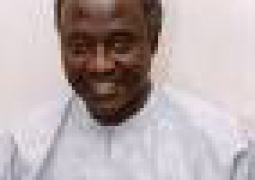Dr. Abdulmonem O.M. Taha the Rapporteur of the Advisory Council for Human Rights of the Republic of Sudan has said the north east African state of Sudan will soon enjoy peace in the region of Darfur.
He said this will depend on all plans going well, based on news from Doha, where peace negotiations between the government in Khartoum and armed movements in Darfur is in progress.
"It is our fervent hope that the sincere efforts exerted nowadays in Doha, where the forum of peace negotiation between the armed movements in Darfur is in progress, will end up with a just, viable and lasting peace that ends the suffering of the people of Darfur for good."
Dr. Taha, who is the head of the Sudanese delegation at the ongoing 47th ordinary session of the African Commission on Human and Peoples' Rights, was speaking last Thursday at the Atlantic Hotel in Banjul.
There is a high level of stability now in Sudan due to the efforts being exerted by the government of Sudan in collaboration with both national and international stakeholders, he said, adding that the existing partnership mechanisms facilitate the regular flow of the humanitarian assistance.
He also said the Sudanese government in collaboration with its partners work together to secure the monthly distribution of more than 315,000 metric tons of relief supplies to more than three million inhabitants in the three states of Darfur. "Permission to work has been given to some NGOs from Europe and US, which were handed over last year’s assets of the NGOs expelled from the country," he added.
On the situation in Sudan, Dr. Taha said, "Sudan has recently managed to successfully pass the greatest ever challenge by holding multi-party presidential and parliamentarian elections, between 11th and 16th April 2010. The preparation for these historic elections have started earlier with the legislative and institutional set-up, through the promulgation of the Political Parties Act in 2007 and the National Election Act in 2008, as well as the creation of the National Election Commission (NEC) and Political Parties Affairs Council."
The initial step of the electoral process started with the electoral Register, with 16 million persons constituting 80% of the eligible voters voluntarily registering, including the internally displaced persons (IDPs) in Darfur and Sudanese abroad.
Out of this figure, he said, 14 million persons managed to practice their right to vote.
He further revealed that 16 political parties had participated in the elections, 10 candidates competed for the seat of the presidency, 8 out of them representing political parties and two were independent.
Dr. Taha also said more than 14 000 candidates competed for 450 seats in the national parliament, and about 2000 seats in the states' legislative councils, and that 25% out of these were allocated to women candidates.
International observers from AU, EU, the Arab League, and IGAD covered the elections, including the Carter Center.
The head of the Sudanese delegation attending the ACHPR session also dilated on the changes and amendments to the laws of Sudan.
"The Criminal Act of 1991 was also amended by introducing the protection of civilians and civilian installations during both national and international armed conflicts. Clear provisions have been inserted in the Act with regards to war crimes, crimes against humanity and genocide in accordance with the terms of the IHL Conventions," he further stated.


